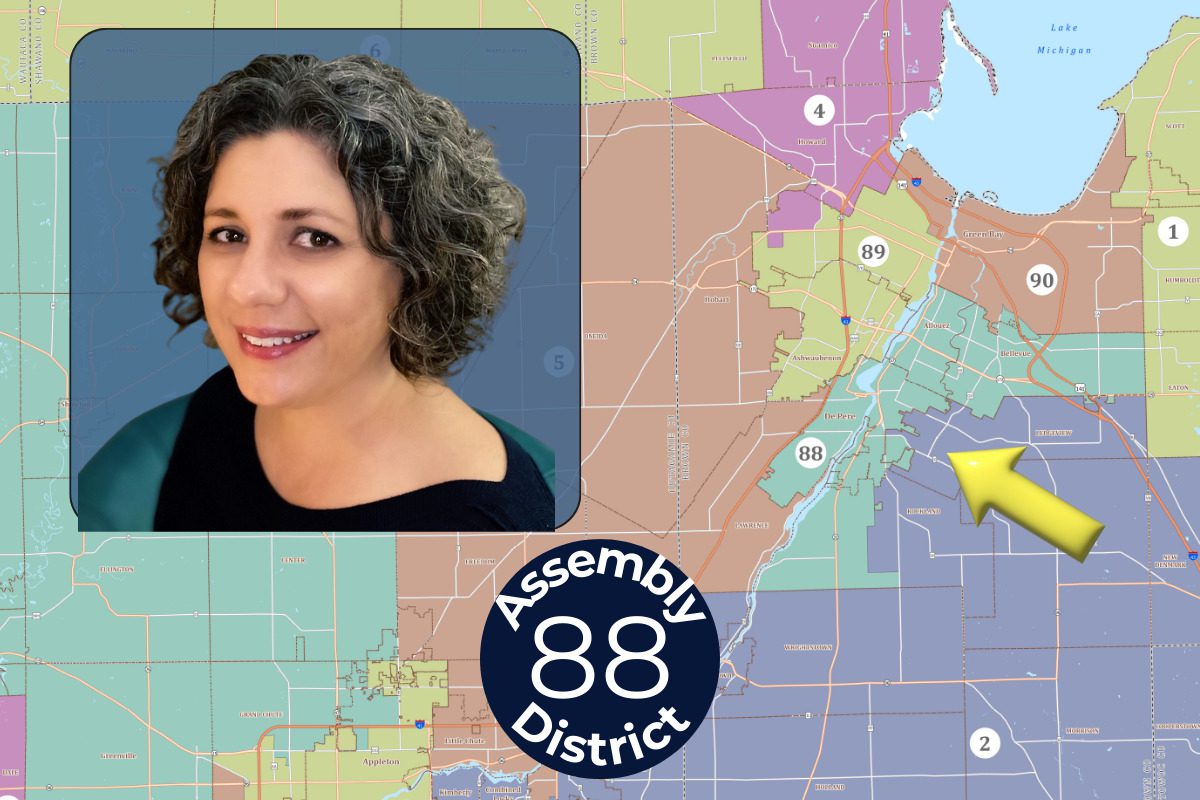
Christy Welch is the Democratic candidate for the open seat in Assembly District 88 in the Green Bay suburbs of De Pere, Allouez, and Bellevue. She and Republican Ben Franklin face off in the Nov. 5 general election.
The candidate for an open seat in the 88th Assembly District pledges to work on cost-saving solutions for housing, childcare, and more.
One of the biggest issues Christy Welch hears from voters while knocking on doors in her suburban Green Bay legislative district is high costs—on housing, groceries, and child care.
But she’s enthusiastic about what she believes can be done to lower high costs for the district’s residents.
First, she proposes that the Wisconsin Legislature hold hearings and investigate companies that are suspected of price-gouging.
Second, she believes the construction industry can be incentivized to build more affordable housing.
Third, on health care, she, like Governor Tony Evers, supports the state finally accepting the Medicaid expansion which would allow the state to expand eligibility for residents to Badgercare. Wisconsin is one of only 10 states that have refused the federal government’s offer since 2014. It’s estimated that the state would have saved $2.1 billion by accepting the funds, not to mention it would have provided more stable, affordable coverage for Wisconsinites and helped rural hospitals stay open.
Welch argues that expanding Medicaid would mitigate long term healthcare costs for the state’s taxpayers.
“Hopefully people would go to the doctor if they have insurance versus waiting for issues to get so bad they have to go to the emergency room,” Welch explained. ”That’s obviously way more expensive and they still don’t have insurance and then everybody has to pay for that anyway.”
Finally, she’s a huge supporter of Evers’ proposal for investing $340 million in the Child Care Counts program to expand access to affordable childcare for Wisconsin’s families.
The Republicans on the budget-writing Joint Finance Committee voted to reject funding the program last year.
Welch criticized Republicans for once again ignoring the needs of Wisconsinites and she rejected Republican vice presidential nominee JD Vance’s childcare “solution” for American families—“having grandma and grandpa help out a little more”—as completely unrealistic.
“Everyone knows someone who is struggling with the availability or cost of childcare,” she said. “I think we would be smart as a state if we treated it like infrastructure and made sure that it was readily available and reasonably priced. Also not everybody has grandparents that are willing to watch.”
Welch’s journey to running for office has been an eventful one over the past several years.
It was the 2022 US Supreme Court decision to overturn Roe v. Wade that propelled Welch down her path to running in the 88th Assembly district.
It wasn’t just the shock that the three ultra-conservative justices appointed by former President Donald Trump had taken away the right of American women to control their own bodies, it was the threat, she said, that they would take away even more rights.
“The commentary from (Justice) Clarence Thomas that gay marriage and contraception should also be looked at…It wasn’t just a tipping point. It was a shoving point,” Welch explained.
It turned out to be a fortuitous time for Welch, a business executive and mother of two to make a life-changing decision. John Macco, the Republican who had represented the local area since 2014, had announced in April that he would not seek re-election after Gov. Tony Evers signed new, more fair electoral maps on February 19 .
Currently Republicans hold 64 seats in the Assembly and Democrats have 35. The new maps give Democrats the chance to reach parity with the Republicans or to even gain a majority.
The Republican opponent that Welch now faces in the 88th Assembly District is Ben Franklin, who is also a first-time candidate in a district that includes the suburbs of Green Bay, and is considered one of the most competitive in the state.
Welch said goodbye to her successful 12-year corporate career as the Chief Business Systems Officer at FyterTech Nonwovens, a large manufacturer of spill control products in Green Bay, and signed up to volunteer with the Democratic Party of Brown County in 2022.
Welch’s husband, Kevin, was already volunteering for the organization, as was her mother—and when the chair of the group decided not to run for re-election, she raised her hand to take on the job.
“I decided to run for chair and treat it like a full-time job and just learn,” Welch says. “I figured it would be the best way to learn, meet people, get connections…and I did learn a ton by going that route.”
After working with other members of the county party, knocking doors, and making phone calls in 2023 to get voters out in support of now-Wisconsin Supreme Court Justice Janet Protasiewicz, Welch was euphoric when Brown County gave her 52% of the vote.
But she said she also came to realize the main qualification in deciding to run for electoral office herself was “to care about your community,” which she passionately did.
Plus, she felt the skillset she’d developed overseeing FyterTech’s human resources department, especially the experience of dealing with high-stress personnel situations during the COVID pandemic, made her equipped to work successfully with people who had diverse and competing viewpoints.
She realistically expects her experience will come in handy in Madison, especially in an Assembly where Republicans will have to adjust to actually working with Democrats for the first time in 15 years.
Stop Starving Schools
Having knocked on thousands of doors, husband Ken frequently driving her to each part of the district, Welch says she’s discovered there are concerns that district voters share no matter where they stand on the political spectrum—public education, for one.
Welch explains that voters don’t understand why the taxes that support their local schools are so high, yet their districts have to frequently go to referendums to cover basic operating costs and to upgrade facilities.
She explains it is a direct consequence of the Republican-controlled legislature.
“They chose to starve our schools,” she said, pointing out that the local property tax share has had to increase as legislators do less to hold up their end of the funding system.
“The fact that the amount that the legislature approves for the state to give each (school) district per student has barely changed in 12 years, has created this huge gap in the amount of money that the districts have to work with.”
As a result, nearly half of Wisconsin’s school districts have been forced to go to referendum this year, according to Wisconsin Watch. Furthermore, the per-pupil increase in spending on public schools from PreK-12th grade between 2002 and 2020 in Wisconsin was the third smallest of any state.
On top of that, in 2023-24 state public schools received 39% less student aid while private voucher schools received 17.8% more state funding per student, according to the Wisconsin Education Network.
Welch condemns the Republican legislators for holding onto a near-record budget surplus of $3.1 billion while depriving public students of the resources they need to get a quality education.
She accuses them of instead prioritizing a tax refund to Wisconsinites that “would mainly go to the most wealthy people,” referring to the $2.1 billion tax cut proposed last January by Assembly Speaker Robin Vos for the current budget year, followed by a $1.4 billion cut for every year after that.
Evers blasted the GOP tax plan as “fiscally irresponsible” and insisted it “would leave the state of Wisconsin unable to meet its basic obligations to fund education, healthcare, public safety and aid to local governments.”
While Welch’s Republican opponent Franklin calls for “high quality education” for Wisconsin’s students on his website, he’s silent on whether he supports increased funding for public schools. In an interview with WisconsinEye he was vague, only saying that making sure that education was funded was a “top priority” for him.
Welch is calling for the state’s school voucher program to be reformed since it has changed from its original purpose in 1990 to give low-income Milwaukee students an opportunity to go to private schools.
The program has exploded with 92,000 students now attending about 400 private, mostly religious schools at the staggering cost of $700 million, all funded by Wisconsin taxpayer dollars.
“There’s a lot of kids whose parents were planning to send them to private school anyway and we’re just subsidizing folks that don’t need it,” Welch pointed out. “And those schools are not subject to the same (curriculum) standards.”
Reproductive Rights Still a Prime Motivator
Welch was not surprised to find many of her district’s residents are highly motivated to vote for reproductive rights. Voters’ memories are still fresh about the Dobbs decision overturning Roe and the 15-month interruption in abortion care in Wisconsin as courts wrestled with how to interpret an 1849 law that conservatives claimed was a total abortion ban.
”People who are Democrats and people who previously voted Republican. That one spans the political spectrum,” she said of those who bring up the issue.
“Some folks strongly feel like it’s a women’s rights issue. And then I talked to a lot of people who tell me they used to vote Republican, but the Republican Party has just gone so far off the rails with MAGA and everything Trump.”
Welch makes her own support of reproductive healthcare extremely clear on her website, calling the ban “a freedom theft of epic proportions” and describes life under the ban for women as a “dystopian horror story” that was real.
Franklin in contrast told WisconsinEye that he’s “pro life,” that he “values life” and only believes in exceptions for “rape, incest and life of the mother.” He refused to be pinned down on whether he would support abortion being legal up to any number of weeks, instead saying that it should be “left to the voters to decide.” (Wisconsin does not have a mechanism for voters to put proposed state laws on the ballot.)
A Family Affair
With Welch’s family enthusiastically helping her campaign and taking advantage of the enthusiasm that came with Vice President Kamala Harris rising to the top of the Democratic ticket, Welch remains “cautiously optimistic” about her chances of flipping the district.
“But we can’t let our foot off the gas at all,” she said.
Welch is especially heartened by the role young voters may play in November. Her son Adam, 21, is so motivated by the potential of a “change” election for Wisconsin that he’s serving as an organizer for another Assembly candidate. Daughter Sophie, 17 is “encouraging” and “not embarrassed” by her mom’s candidacy—“So that’s good,” Welch jokes.

Harris says nation must accept election results while urging supporters to keep fighting
Harris delivered her remarks at Howard University, her alma mater and one of the country's most prominent historically Black schools, in the same...

SHIFT-RIGHT, BACKSPACE
Wisconsin is the state that puts Trump in the White House—again. Sen. Tammy Baldwin hangs on for a narrow win. Unrigged maps have given the...

Presidential race too close to call as vote counts continue in key swing states
Results in Michigan, Pennsylvania, and Wisconsin may not come in until Wednesday morning, and Arizona and Nevada are unlikely to see calls made...

Some Milwaukee absentees to be retabulated out of ‘abundance of caution,’ after consulting with GOP & Dem officials
About 31,000 absentee ballots will be run through tabulating machines again after doors were found not properly closed. Approximately one-third of...





